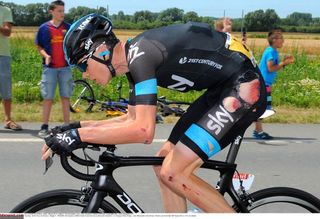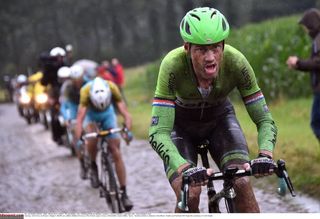Top 10 conclusions from the Tour de France
Part 1: Nibali, Contador, and Team Sky





Froome and Contador would have found this Nibali tough to crack
As Vincenzo Nibali’s overall advantage increased, so too did the frequency with which he was asked about the effect Alberto Contador and Chris Froome’s early abandonments had on the Tour de France. Indeed, it was instructive that while Nibali was happy to answer repeated questions on doping and Astana’s murky past during his press conferences, the only (mild) signs of exasperation came when asked once more about the grand absentees.
Each time, Nibali’s response was a variation on the same key themes – namely, that he had built up a sizeable overall lead on the cobbles, he had shown himself to be in remarkable condition and, besides, you can only beat what’s put in front of you. All of this is very true, of course, but speculating on the hypothetical Froome-Contador-Nibali battle is a fascinating parlour game nonetheless.
Had Froome and Contador emerged unscathed from the opening ten days and reached the Alps with over two and a half minutes to recoup, they would have found it no easy task to overhaul this Nibali, particularly given his growing savvy when it comes to making calculations and dosing energy during a three-week race. On the evidence of his Vuelta win in 2010, for instance, Nibali would have known when to follow Froome and Contador and when to let them go, and looked to limit any losses accordingly.
Indeed, for all that they were a level above him at the Dauphiné in June, it’s not a given that it would have been the same at the Tour, such was Nibali’s prodigious leap in condition, which he demonstrated by matching Contador on the short, sharp climb at Gerardmer.
It’s certain, of course, that Nibali would have had company in the high mountains were Froome and Contador still present and he would not have won by almost eight minutes. But like Luis Ocaña’s victory at the 1973 Tour in the absence of Eddy Merckx, it would be unfair to place an asterisk next to Nibali’s win. He would have been an exceedingly tough nut to crack. (BR)
Could Team Sky have avoided their capitulation?
On stage two of the Dauphine in June, as Chris Froome outsprinted Alberto Contador for the win atop the Col du Béal, it looked as though business as usual had been restored ahead of the Tour de France. After a few jittery months Sky and their captain had taken control of a major race with their talisman in yellow after two wins in two days. However, with hindsight the Col du Béal win proved to be nothing more than a false dawn: Froome crashed days later and with that his entire Tour bid was blown off course.
Get The Leadout Newsletter
The latest race content, interviews, features, reviews and expert buying guides, direct to your inbox!
It’s been suggested that the team now face a major crisis and that a considerable upheaval is required but hyperbole and emotions aren’t what’s required.
Remember, Team Sky were in a similar position in 2010 when they stuttered under the pressure of a debut Tour and Wiggins collapsed in the mountains. Back then they had the get out of jail card of being a new player on the biggest stage but this time the excuses are somewhat thinner on the ground and bad luck can’t account for everything.
However, perhaps the problems go further back than this year. In 2012 their Tour team bristled with talent and depth. Last year the cracks were already apparent and Froome’s utter dominance papered over a team that looked on the edge at certain moments.
The winter signings of 2013 simply weren’t competitive enough and while they’ve been busy signing talent for the future, Kennaugh, Boasson Hagen, and Porte have either stagnated or gone backwards. The losses of Rogers and Uran haven’t been successfully replaced.

Say what you want about Astana but they brought in the experience of Scarponi and persuaded Fuglsang to devote his ambitions to Nibali’s cause. In a straight out gun fight you want as many shooters pointed at your enemy as possible and Froome simply hasn’t had the ammo. Perhaps that partly explains why he looked isolated in the bunch before his crash on stage 4. The tumbles during the following day only compounded his fate, while the TUE story, his biography, the inhaler furore, the back problems and the pressure of defending champion all seemed to chip away at him. As he climbed into the team car on stage five he looked broken in more ways than one.
At the finish in Paris, Sir Dave Brailsford correctly erred on the side of caution and stressed the need not to panic, both in terms of team set-up and rider recruitment. This isn’t the time to dust off Plan Bradley and nor is it the time to poach a contracted Fabio Aru from Astana or Leopold Konig from Netapp. Porte and Froome haven’t become poor riders overnight and if you take out all the emotion and base your case on facts, then outside of the Tour Team Sky have won nearly as many stage races in 2014 and they did in 2013 and 2014. The dominance might be over but that doesn’t mean that they can no longer be successful.
The re-signing of Thomas is one piece in a jigsaw Brailsford must solve but one feels that there’s still some deadwood at Sky. A few fresh faces, especially for the flat road stages should be the recruitment priorities as Froome doesn’t need climbing support in the same manner. Two years ago the talk was of trying to win all three grand tours but now the focus must be on assessment, two quality signings and plotting to get the best out of their riders. (DB)
The Tour de France's loss is the Vuelta a España's gain
Crashes, injury and selection decisions meant that several big names of the sport did not start, complete and figure in the results at the Tour de France. However the Tour de France's loss is the Vuelta a España's gain as many of them will ride this year's Vuelta, ensuring this year's third Grand Tour has one of the best casts for many years.
Chris Froome was left batter and bruised and with a fractured wrist and broken hand after his two crashes on stage four and five of the Tour. He's currently training in California and is likely to be the favourite for the Vuelta.
Alberto Contador has ruled himself of the Vuelta but Alejandro Valverde will ride with Movistar teammate and Giro d'Italia winner Nairo Quintana and Joaquim Rodriguez (Katusha) but will back to his best in September after finding his form at the Tour.
Other riders who contested the Giro d'Italia but missed the Tour de France and are expected to target the Vuelta include Fabio Aru (Astana), Cadel Evans (BMC), sprinter Nacer Bouhanni (Fdj.fr) plus Ryder Hesjedal and Dan Martin (Garmin-Sharp).
Further names to watch for in Spain include 2013 Vuelta winner Chris Horner (Lampre-Merida), Carlos Betancur (Ag2r-La Mondiale), Tom Boonen (Omega Pharma-QuickStep), Fabian Cancellara (Trek Factory Racing) and Peter Sagan (Cannondale). (SF)
A route for all seasons
There was a time when Tour de France routes seemed almost to follow a set pattern. After a flat opening week, the Alps and Pyrenees would be divided by a series of transition stages and then bookended by two long time trials. Since Christian Prudhomme took over as race director in 2007, however, the organisers have become increasingly inventive in devising the parcours, and 2014 might just have been their masterpiece.
Rather than a predictable series of bunch finishes in the opening week, the overall contenders were called into action on the second day on the exceedingly hilly stage to Sheffield. Three days later, the cobblestones of Paris-Roubaix provided yet another dramatic shake-up to the general classification.
The decision to spend more time in the Vosges than the Alps was as refreshing as it was brave. Three days of short, punchy climbs provided constant drama that outstripped what was provided on the longer passes of the Alps. In the final week in the Pyrenees, meanwhile, the organisers were sensibly opted for shorter and more explosive stages, while the lone, long final time trial added an additional layer of suspense to the action.
The only pity, of course, is that the destination of the yellow jersey was all but decided after ten days of the Tour as two of the main players crashed out. Such circumstances are beyond the organisation’s control, but they had provided a worthy stage. The Alps and the Pyrenees will always be an integral part of the Tour, but the desire to seek out decisive stages on different kinds of terrain is to be applauded. More of the same please. (BR)

Talansky and van Garderen provide the US with hope
It’s been a Tour of contrasting fortunes for America’s two biggest GC stars, Tejay van Garderen and Andrew Talansky. The former grappled his way to fifth overall while the latter crashed and was forced to abandon in tears. Heading into the race Talansky looked like the man most likely to shine. His Dauphiné win, coupled with the fact that Garmin came into the Tour with one clear objective had the rider pegged as an outsider for the podium.
Van Garderen had looked short of top level form at the Dauphine due to a hip fracture he sustained in Romandie but with the Tour over it’s hard to gauge where the pair are in terms of their chances of one day winning a grand tour. Robert Millar called van Garderen’s ride ‘limited’ and to a large extent that’s true. He often looked to be on the defensive but that hasn’t stopped riders winning the Tour before. Indurain won five straight editions with a similar approach. The Spaniard was a more robust athlete and this isn’t to suggest that van Garderen will go and dominate the Tour for years to come but at 25 – yes we had to check he’s still that young - time is on his side.
He’ll never light up the climbs with accelerations but if he can avoid that one bad day and enjoy a more time trial heavy course he may prove a few more doubters wrong.
As for Talansky, despite his crash he comes out of the Tour de France with a reputation on par with van Garderen’s. Still the promising all-rounder and still with plenty of time on his side, the Garmin rider must also show signs of steady improvement next year. It’s difficult to tell if Talansky is better suited to the mountains or time trials, especially given his lack of experience in long tests against the clock, but if he can return to the Tour de France in 2015 with this year’s level of form then he’s deserving of the team being built around him once more. (DB)
Daniel Benson was the Editor in Chief at Cyclingnews.com between 2008 and 2022. Based in the UK, he joined the Cyclingnews team in 2008 as the site's first UK-based Managing Editor. In that time, he reported on over a dozen editions of the Tour de France, several World Championships, the Tour Down Under, Spring Classics, and the London 2012 Olympic Games. With the help of the excellent editorial team, he ran the coverage on Cyclingnews and has interviewed leading figures in the sport including UCI Presidents and Tour de France winners.